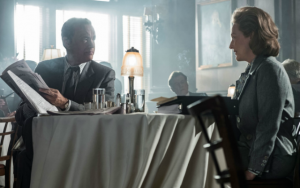THE POST: 4 STARS. “a little heavy-handed but these are heavy-handed times.”
 The air of paranoia that hung over “All the President’s Men,” another movie centered on the investigative reporting of The Washington Post, is noticeably missing in “The Post.” Instead, the new Steven Spielberg film is a fist-pump-in-the-air look at the integrity and importance of a free press. It’s a little heavy-handed but these are heavy-handed times.
The air of paranoia that hung over “All the President’s Men,” another movie centered on the investigative reporting of The Washington Post, is noticeably missing in “The Post.” Instead, the new Steven Spielberg film is a fist-pump-in-the-air look at the integrity and importance of a free press. It’s a little heavy-handed but these are heavy-handed times.
Meryl Streep plays Katharine Graham, the first female publisher of a major American newspaper. The socialite inherited The Washington Post following her husband Phil Graham’s death in 1963. “Kate throws a great party but she’s only here because her husband died,” harrumphs board member Arthur Parsons (Bradley Whitford). With the paper bordering on insolvency she has tough decisions to make.
Meanwhile hardnosed editor Ben Bradlee (Tom Hanks) is looking for a story that will help the paper break out of its local market and go national. “Are any of you tired of reading the news,” he asks his staff, “instead of reporting on it?”
When the New York Times breaks the story of a massive cover-up and is shut down by the Nixon White House, Bradlee sees an opportunity to scoop the Times and make a splash. Trouble is, the story involves several people close to Graham, most notably former Secretary of Defense Robert McNamara (Bruce Greenwood), who prolonged the Vietnam War despite knowing it was a no-win situation.
Graham must make the decision to publish or not. Running the so-called Pentagon Papers would expose years of government secrets, make an enemy of President Nixon and could scare off the investors she’s been courting. Not reporting could endanger young the Americans who were still being drafted and sent to fight an unwinnable war. “The only way to assert the right to publish is to publish,” argues Bradley.
No spoilers here, but the historical record shows that bombshell revelations were made and today The Washington Post is still a going concern.
“The Post” is a historical tale that feels as timely as any front-page story in today’s paper. A high-stakes look at journalism before the age of fake news, it reminds us of the importance of objective, investigative reporting in an era of secrecy, lies, and leaks. It’s a ‘if you don’t know your past, you don’t know your future” message movie that shines a light on a watershed but mostly forgotten slice of our past.
The Pentagon Papers were a significant turning point in our recent history. They were proof of a credibility gap between what politicians say and what they are doing. For Bradlee, publishing these documents sent a message that the White House had no influence on what stories made the front page and which don’t. “The press must serve the governed not the governors.”
Hanks and Streep, the two most trusted people in Hollywood, are solid as the two most trusted people in Washington.
As Graham, Streep is a woman who transcends the attitudes of her male advisors to do the right thing regardless of the repercussions. It’s a slow burn performance as she slowly sheds the weight of her socialite upbringing to embrace an outgoing and progressive point of view. As she grapples with publishing and possibly losing everything versus playing it safe, she becomes one of the film’s few characters with an arc.
Hanks plays Bradlee with bluster. As a noted collector of old school typewriters in real life, Hanks must have relished the chance to surround himself with the clickety-clack soundtrack of a newsroom in full tilt boogie. He is the movie’s reckless moral code, barking orders and making larger-than-life pronouncements on the importance of a free press. Hanks is at the Spencer Tracey stage of his career, an actor who brings with him an aura of decency and strength; the epitome of American exceptionalism made flesh. Despite the character being one-note Hanks breathes life into him, even if only as a spokesperson for the power of the first amendment.
“The Post” is propped up by good supporting performances, although fine actors like Sarah Paulson and Tracy Letts are stranded in roles that don’t give them much to do. Bob Odenkirk as Ben Bagdikian, one of the architects of the plan to publish the Pentagon Papers, fares better in one of the handful of roles expanded to full bloom.
The expected Spielberg touches are there as well. The Washington Post building shakes as the massive printing presses roar to life, a no-so-subtle metaphor of the upset the Pentagon Papers are about to cause in Washington.
Combined, all the elements add up to a movie that aims to make a statement while avoiding preaching to its audience. Spielberg, Hanks and Streep are entertainers first and foremost, and they do entertain here, but they also shine a light on a historical era whose reverberations are being felt today stronger than ever.
